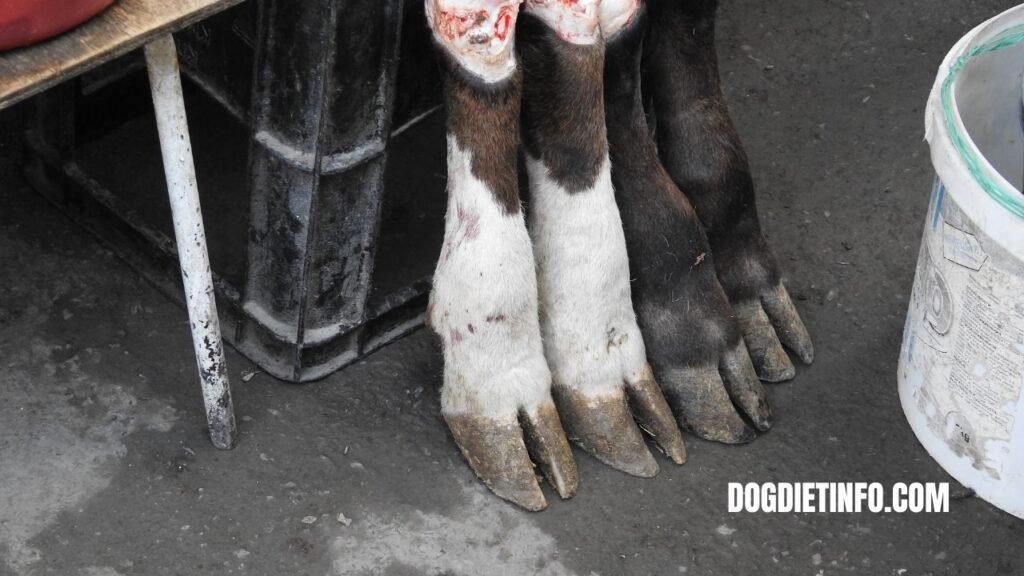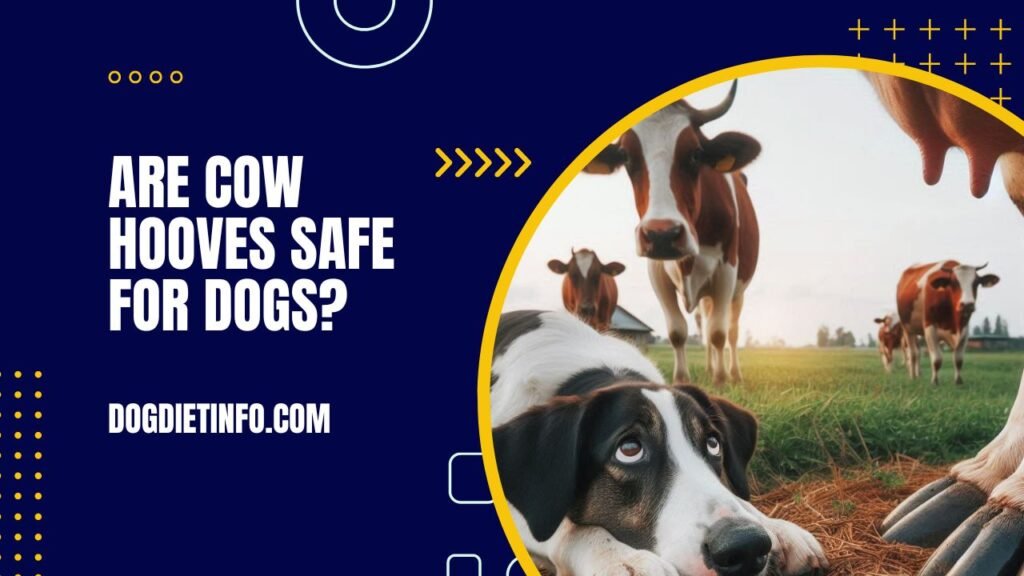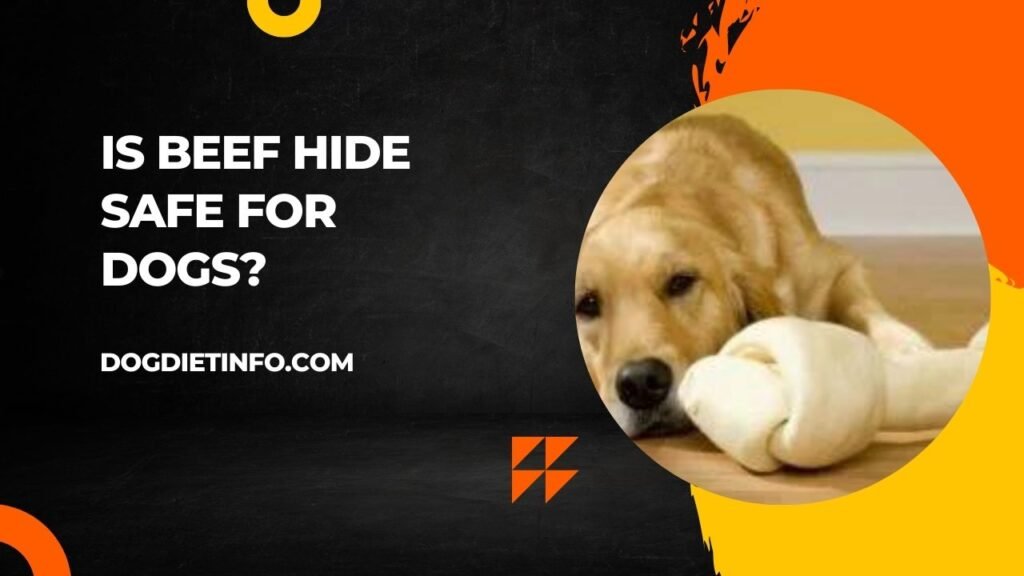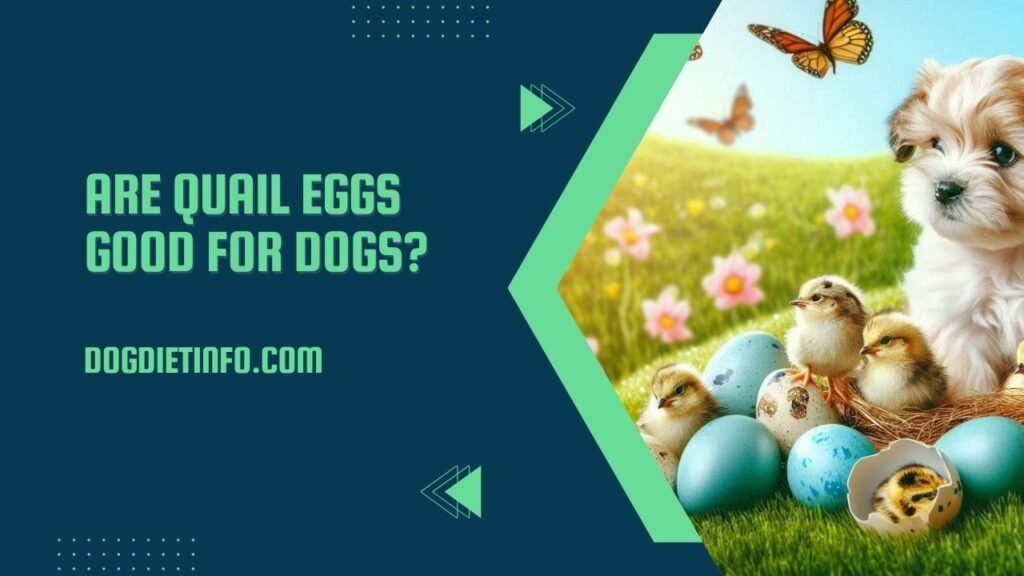Are Cow Hooves Safe For Dogs? Cow hooves can be safe for dogs when used under supervision, but they can also pose risks like splintering, causing choking.
Cow hooves are one of the more popular natural chew toys available for dogs, loved by both pet owners and dogs alike.
They are affordable, natural, and long-lasting, making them a go-to choice for keeping dogs entertained. However, there are concerns about the safety of cow hooves, as they can pose certain health risks.
In this comprehensive guide, we’ll explore the benefits, potential dangers, and safe practices when using cow hooves for dogs.
By the end, you’ll be better equipped to decide if cow hooves are the right choice for your pet.
Contents
What Are Cow Hooves for Dogs?
Cow hooves are the trimmed and thoroughly cleaned hooves of cattle, processed and packaged specifically as a chew toy for dogs. [Are Cow Hooves Safe For Dogs?]
They are hard and durable, making them a favorite for many dog owners who want a natural option that lasts longer than synthetic or softer chews.
Cow hooves are also often hollow, which allows for the option of stuffing them with peanut butter, cheese, or other treats to provide an additional challenge and keep dogs engaged.
Why Are Cow Hooves Popular?
The popularity of cow hooves among dog owners can be attributed to several factors:
- Natural and Minimal Processing: Unlike many commercial chews, cow hooves are natural and typically undergo minimal processing, appealing to those looking for an organic option.
- Long-Lasting: Cow hooves are hard and dense, making them difficult for most dogs to chew through quickly. This makes them a cost-effective choice for those looking for something that will last.
- Dental Benefits: Chewing on cow hooves can help reduce tartar and plaque buildup on a dog’s teeth, promoting better dental hygiene.
Benefits of Cow Hooves for Dogs
When used appropriately and chosen carefully, cow hooves can provide several benefits to dogs. Let’s explore these in more detail:
1. Dental Health Benefits
Cow hooves can help maintain a dog’s oral hygiene by scraping away plaque and tartar as they chew. [Are Cow Hooves Safe For Dogs?]
Over time, this action helps reduce the risk of periodontal diseases, which are common in dogs and can lead to bad breath, tooth loss, and other health issues.
Regular chewing can also help massage the gums, promoting overall dental health. However, it’s crucial to monitor chewing, as aggressive chewers may damage their teeth.
2. Mental Stimulation
Chewing is a natural behavior for dogs, and it provides significant mental stimulation, especially for high-energy breeds or dogs that are left alone for extended periods.
Chewing on cow hooves can keep dogs occupied for hours, preventing boredom-related behaviors such as chewing on furniture, digging, or excessive barking.
This mental engagement is essential for their overall well-being and can help alleviate anxiety and stress in some dogs.
3. Cost-Effective and Durable
Compared to many other dog chews and treats, cow hooves are relatively inexpensive and long-lasting. [Are Cow Hooves Safe For Dogs?]
They can provide hours or even days of chewing for dogs, making them a cost-effective solution for pet owners looking for a durable option.
When compared to rawhide chews, which can be consumed quickly, cow hooves are more durable and economical.
4. Natural and Versatile
Cow hooves are a natural product, free from the artificial ingredients and preservatives found in many processed dog chews.
They can also be filled with treats or pastes, such as peanut butter or dog-safe cheese, to add an extra layer of engagement and enjoyment.
This versatility makes cow hooves a popular choice among pet owners who want to provide their dogs with a natural yet engaging chew.

Are Cow Hooves Safe For Dogs?
While cow hooves do offer several benefits, there are also some potential risks associated with them. [Are Cow Hooves Safe For Dogs?]
It is important to weigh these risks carefully to ensure that they are a safe option for your dog. Below are the primary safety concerns:
4.1. Potential Choking Hazards
One of the most significant risks associated with cow hooves is the potential for choking. When chewed down to smaller pieces, cow hooves can break off, and if a dog swallows these fragments, it can lead to choking.
Larger fragments can get lodged in the throat, leading to breathing difficulties and potentially life-threatening situations. It’s essential to remove any small pieces that break off during chewing to minimize this risk.
4.2. Digestive Issues
Another risk associated with cow hooves is digestive blockages. If a dog swallows a large piece, it could cause a blockage in the gastrointestinal tract.
Symptoms of a blockage include vomiting, loss of appetite, lethargy, and abdominal pain. Digestive blockages can be very serious and often require surgical intervention, which is why monitoring your dog while they chew on cow hooves is crucial.
Moreover, sharp pieces can cause internal injuries, leading to infections or other severe complications. [Are Cow Hooves Safe For Dogs?]
4.3. Dental Damage Risks
Cow hooves are extremely hard, which can lead to dental fractures or damage, particularly in aggressive chewers. Dogs that bite down too hard may crack or break a tooth, which can be painful and expensive to treat.
In severe cases, broken teeth can lead to root infections or abscesses, requiring extraction or other dental procedures.
It’s essential to consider your dog’s chewing style when deciding whether cow hooves are an appropriate choice.
4.4. Risks of Splintering
Cow hooves can splinter, especially when they start to wear down or if they are of lower quality. These splinters can be sharp and pose a risk of cutting a dog’s mouth, gums, or digestive tract.
A cut or puncture can lead to infections, abscesses, or other serious health issues. Opting for high-quality cow hooves and inspecting them regularly for splinters or cracks is crucial for minimizing this risk.
How to Choose Safe Cow Hooves for Dogs
If you choose to give your dog cow hooves, there are a few important guidelines to follow to ensure their safety:
Quality Selection
Always opt for high-quality, natural cow hooves that have been minimally processed. Reputable brands will offer hooves that are free from chemicals, preservatives, and artificial flavors. High-quality products are less likely to splinter and cause injuries.
Avoiding Chemically Treated Products
Some cow hooves are treated with chemicals or flavoring agents to make them more appealing to dogs.
However, these added chemicals can sometimes be harmful and can cause digestive upset or allergic reactions in sensitive dogs.
Always read labels carefully and choose untreated, natural hooves whenever possible. [Are Cow Hooves Safe For Dogs?]
Size Matters
Selecting the right size hoof for your dog is crucial. A hoof that is too small can be easily swallowed, increasing the risk of choking or blockages.
Conversely, a hoof that is too large may be difficult for smaller dogs to chew and could cause jaw strain or discomfort.
Choosing an appropriately sized hoof based on your dog’s breed, size, and chewing habits is vital for safety.
Inspect Regularly
Check the hoof regularly for cracks, splinters, or sharp edges. Remove the chew if you notice any signs of damage that could pose a risk to your dog. [Are Cow Hooves Safe For Dogs?]
Supervision and Safe Chewing Practices
Supervision is critical when offering cow hooves or any chew toy to your dog. Always keep an eye on your dog while they chew, and remove the hoof if it becomes too small or if your dog starts to chew aggressively.
It’s also important to know your dog’s chewing style; if your dog tends to gulp or swallow large pieces, cow hooves may not be the safest option. Instead, consider alternative chews that are designed to be safer for aggressive chewers.
Alternatives to Cow Hooves
If you are concerned about the risks associated with cow hooves, there are several safer alternatives that can provide similar benefits without the associated dangers:
Natural Chew Alternatives
- Bully Sticks: A digestible and durable chew option that provides similar dental benefits without the risk of splintering or breaking teeth. [Are Cow Hooves Safe For Dogs?]
- Antlers: Another long-lasting natural chew, though they can also be hard and should be used under supervision to prevent dental fractures.
- Raw Bones: Raw bones, particularly those designed for dogs, offer dental benefits and mental stimulation. However, they should be appropriately sized and monitored closely to prevent splintering.
Synthetic Chew Alternatives
- Nylon Bones: Durable and long-lasting, nylon bones come in various sizes and flavors and are designed to be safer alternatives to natural bones and hooves. They don’t splinter and are great for aggressive chewers.
- Dental Chews: Soft, edible chews specifically designed to promote dental health. They are less likely to cause dental fractures and can be a safer option for dogs prone to aggressive chewing.
Final Verdict
Cow hooves can be beneficial for dogs in terms of dental health, mental stimulation, and cost-effectiveness.
However, they also pose significant risks, including choking, digestive blockages, dental damage, and splintering.
For some dogs, especially those with aggressive chewing habits, the risks may outweigh the benefits. [Are Cow Hooves Safe For Dogs?]
If you choose to give your dog cow hooves, prioritize high-quality, natural products, choose the appropriate size, and always supervise their chewing. Alternatively, explore other chew options that offer similar benefits with fewer risks.
See Also: Is Kibbles And Bits Good For Dogs?
FAQs
Can puppies chew on cow hooves?
Puppies have softer teeth and jaws, making them more susceptible to dental fractures. For this reason, softer, more pliable chews are a better choice for puppies.
How frequently should cow hooves be given to dogs?
The frequency depends on the dog’s chewing style, size, and dental health. Moderation is key to prevent overuse and potential health issues. [Are Cow Hooves Safe For Dogs?]
What should I do if my dog swallows a piece of cow hoof?
Immediately contact your veterinarian if you notice any signs of distress, such as choking, gagging, vomiting, or abdominal pain. Quick action can prevent severe complications.
What are signs of dental damage to watch for?
Signs of dental damage include reluctance to chew, dropping food while eating, pawing at the mouth, or visible cracks in the teeth. If you notice any of these symptoms, consult your veterinarian.
What are the symptoms of digestive issues after chewing on cow hooves?
Symptoms may include vomiting, loss of appetite, lethargy, abdominal pain, and difficulty defecating. If these symptoms occur, seek veterinary care promptly.
Conclusion: Are Cow Hooves Safe For Dogs?
Cow hooves can be a good option for some dogs, but they come with risks that should not be ignored. Always make an informed decision based on your dog’s unique needs and chewing habits.
It’s also important to consult with your veterinarian for personalized advice, especially if you have concerns about your dog’s chewing habits or overall health.

Derrick Wilcox is a certified canine behaviorist with over 12 years of experience at Happy Paws Animal Clinic and Pawsitive Training Center, helping pet owners ensure safer, healthier, and happier lives for their dogs.



